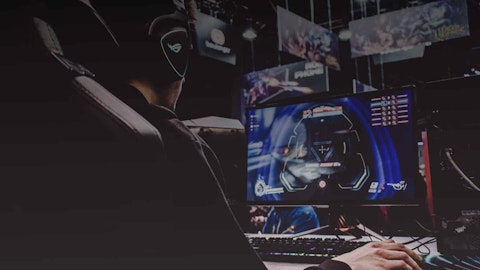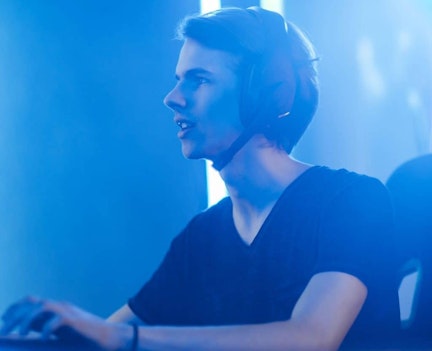
By 2020, it is predicted that esports will generate £1bn in global revenue and attract audiences — in arenas and online — of 600m, double the current figure. Last year’s League of Legends world final, where fans gathered live and in front of screens to watch players compete in a fantasy battle video game for a shared prize of more than £5m, was watched by 14.7m people simultaneously.
On the face of it, this presents a wonderful opportunity for brands to be involved, tapping into an engaged, youthful, passionate and growing audience. However, the category has already become highly congested, and has a darker side.
Is esports redefining 'sport'?
Digital culture is redefining what sport means and young people are redefining what ‘playing sport’ entails. The esports world is made up of competitive, tournament-led video gaming, with professional leagues, mass spectatorship and significant sponsors.
For brands looking to partner with esports teams, tournaments and organisations, much of its appeal lies in the fact that the industry transcends borders, ages and often genders. It is not reliant on TV companies buying rights and selecting when, where and how to show content, and aims to bond disparate communities who feel under-represented by traditional sports.
And it’s an industry in a state of unprecedented disruption, which means potential for brands to build new relationships and relevance with potential customers.
Early projections suggest that esports revenues will come via three main channels: the sale of content rights to broadcasters; direct payments from live streaming services — some live tournaments can attract tens of millions of online spectators — and advertising revenues initially from the games industry, but ultimately from broader product placement.
Esports is the first major global entertainment trend to take its lead from Asia — largely pioneered in South Korea, China now provides the largest bloc of viewers — rather than the west. Pro-players and viewers are predominantly in their teens and early 20s and are thus attractive to advertisers and sponsors. According to Nielsen, more than 600 esports sponsorship deals have been struck since the beginning of 2016. The fastest-growing revenue stream, say the report’s authors, is media rights, which they expect to generate $340m by 2020.
The players involved prepare and train with an intensity which may be comparable to athletes in traditional sports
Last year, the Paris 2024 bid team expressed interest in including esports as a medalling event. The International Olympic Committee (IOC) acknowledged the rapid growth of competitive gaming and released a statement that said, “competitive esports could be considered as a sporting activity, and the players involved prepare and train with an intensity which may be comparable to athletes in traditional sports.”
How fast is esports growing?
A recent report by the Milken Institute claims that professional esports brought in roughly $660 million dollars in 2017 and projected that number to grow to over $1 billion by the end of 2019. Currently, 17 colleges offer athletic scholarships for competitive gamers.
Many believe this will lead to a tectonic shift in media distribution, IP monetisation and advertising. Three core elements are contributing to the esports industry’s rise as the next major spectator sport: streamed competitions with organised leagues, professional players whose efforts can be viewed anywhere, and live events in major offline sports venues. It’s why platforms such as Twitch, where people from all over the world can tune in and watch gamers, or “streamers,” play video games, is the largest live streaming platform in the US. In 2014, Amazon bought Twitch for nearly $1 billion, though some business analysts questioned the move. Today, Twitch has approximately 5 million active viewers who spend 106 minutes each day watching live gaming, which ranks higher than prime time cable TV networks like CNN.

Given this growth, linear television networks and sports team owners have taken notice of esports’ potential. ESPN, TBS, SyFy and Telemundo have partnered with competitive gaming platform FACEIT to broadcast esports events. Sports figures such as New England Patriots owner Robert Kraft, Shaquille O’Neal, and Alex Rodriguez all have ownership stakes in esports teams. Etienne’s Cloud9 teams recently gained $25 million from investors including Reddit co-founder Alexis Ohanian.
What's the reaction from the top players?
Just a few months ago, Japanese software company Akatsuki announced the launch of the League of Professional esports, consisting of esports teams owned by existing football clubs such as Ajax, Real Sociedad and Galatasaray. Moves such as this have led many observers to suggest that the slow gravitational shift away from consoles – despite being slowed significantly by the success of the Nintendo Switch and Sony’s Playstation4 – now looks locked-in. In terms of global revenues, according to research by Newzoo, mobile gaming is valued at around $70bn, twice the size of the console market.
Students at the Tokyo College of Anime are taking a course to prepare them for careers as professional esports commentators
American sports leagues have also taken notice and are eager to cash in. The National Hockey League’s first esports tournament will begin this year and the National Basketball Association is forming an entire competitive league around the “NBA 2K” video game with 17 teams set to participate.
A cult of celebrity similar to that of traditional athletes is already beginning to form with some esports stars, in which fans have a relationship with the players that is almost 24/7. They can follow them on Twitter or watch them practice on Twitch. Thus, one of the biggest tools that esports has is its community. Many predict that as young fans grow up and have children of their own, they will instil that same love in their children resulting in a generational shift of attitudes towards acceptance.
Plans are underway to build dedicated esports arenas at two of the largest casinos in Las Vegas. In Japan, students at the Tokyo College of Anime are taking a course to prepare them for careers as professional esports commentators.
And much of this younger audience have money to spend. Tickets can cost as much as a top-flight Premiership football game. On top of that comes the merchandising: fans of teams such as Cloud9, Fnatic and Immortals can buy branded shirts, mouse pads and even dedicated chairs. In Activision Blizzard’s new Overwatch League, it splits the revenues from media rights, merchandise and sponsorship with its teams. The advent of 5G mobile services, say analysts, is likely to produce a fresh wave of content and distribution deals. But as one UK-based TV executive puts it, “this is all happening without a clear sense of where the big money is to be made”.
But what about the sexism, scandals and violence?
However, there are flaws in its inexorable rise. Although gaming as a whole now has a fairly even gender split — thanks to the success of mobile games such as Candy Crush and Pokémon Go — there are very few female esports professionals. The highest-earning woman — a 23-year-old Canadian called Sasha “Scarlett” Hostyn, who specialises in strategy games — is transgender. So sexism does exists, as it does in many mainstream sports.
In addition, often, the marketplace is both crowded and chaotic with business plans that lack rigour and sometimes even funding.
Scandals that have erupted around the non-prescription use of the attention-deficit drug Adderall, and cheating to exploit secret software glitches in particular games, have entrenched the view that esports is going through a dangerously unregulated phase. Yet others say its ethical problems are not much different from traditional sport.
The strongest dissenting voices about the growth of the sector are to be found in an unexpected place: the “traditional” video games industry, particularly the Japanese groups Sony and Nintendo — whose console businesses feel threatened because the most popular esports titles are, by and large, played on a PC. Although they are interested in esports, the business model is still too unclear to justify heavy investment, they say.

Currently, organisations such as the Olympic Committee are reluctant to show wholehearted enthusiasm for esports because of the high likelihood of violence, explosions and killings being the focus for some games, particularly first-person shooters. This naturally raised questions about how safe it is to expose young people to esports.
And, of course, reach is still limited. Despite the obvious signs of growth, especially in the Far East, popularity is not shared to the same degree in all countries.
Esports is without doubt a phenomenon but one whose nature is changing all of the time. Opportunities are extensive – it’s just a question of whether those opportunities are best exploited now or as the market matures.
At Hall & Partners, we combine in-depth industry knowledge with rigorous analysis of your brand’s strengths and opportunities. This means we are uniquely positioned to help you decide if an esports partnership is the right decision for your brand or if it would be ‘game over’.
Get in touch today






